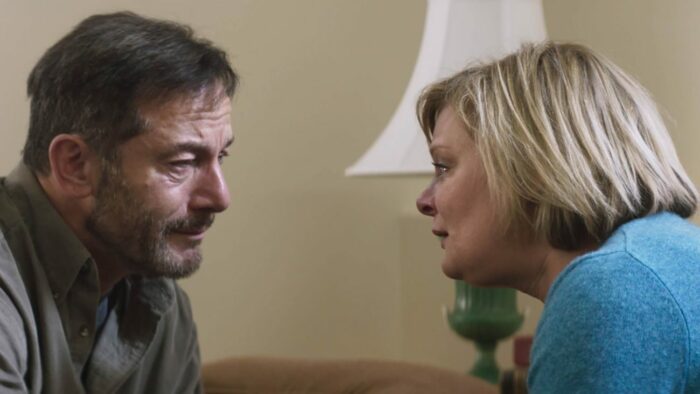This article is part of a series reviewing the films of the 2021 BFI London Film Festival, previous entries of which are available on the site. Today’s coverage includes not only the two best films of the festival so far, but two of the best films of the year and, in this reviewer’s opinion, one of the best films of the last decade.
Boiling Point

I’ve worked in a kitchen and, more relevantly, I’ve worked in a badly managed kitchen, run by someone who overbooks and overworks their staff, and from my limited experience, I can say that now only is Philip Barantini’s Boiling Point an absolutely gripping piece of drama, but it’s absolutely spot-on as well. Honestly, I think it’s kind of underplayed compared to my own experiences.
An expansion of Barantini’s earlier short film of the same name, Boiling Point follows head chef Andy (Stephen Graham) and his staff on what is destined to be the worst day of his professional career; the night that will make or break him, and fate has it sights dead set on the latter. Described as “mad Friday”, the restaurant owner has blithely booked out 100 tables full of customers all expecting the very best, and by ‘best,’ they mean ‘whatever they want.’ To make matters worse, Andy has just moved into a new flat and his head is all over the place, leading to a dressing down from the sanitation inspector as soon as he arrives. He passes the message on to his staff, but the real problem is him and he knows it, and as customers start arriving, things go from bad to worse when his condescending old mentor (Jason Flemyng) shows up with a restaurant critic on his arm.
Boiling Point‘s closest relative would be Locke, the mesmeric Tom Hardy solo vehicle, but this is, I think, the better film. The script flawlessly alternates moments of humour and tenderness with intense stress, from dealing with the pr*ck on table 7 and staff arriving late, to the personal burdens and commitments weighing upon each staff member, especially Andy. Once again, it’s an opportunity for Stephen Graham to show what a powerhouse performer he is, but the amazing thing is, he doesn’t even register as a standout because everyone is just that good in this. If forced to pick a standout, I would instead have to go with Vinette Robinson as sous-chef Carly, the overworked one-woman army keeping the restaurant open. But, just as the kitchen staff work as a team, the whole ensemble kick into gear to give a mesmeric virtuoso showcase.
The dialogue and performances were so enthralling that it was twenty minutes in before I noticed that the whole thing was being done in a single take. Normally, I hate this sort of high-wire gimmick, but it was so unobtrusive that it worked perfectly to escalate the tension and place you in the thick of the action, and all the performers were (and are) up to the task. With movies that are all shot in one take, they often begin to feel less like films and more like immersive theatre, and with its realistic setting and brilliantly naturalistic dialogue and intense performances, Boiling Point understands that and makes it a virtue. It’s genuinely up there with Victoria as one of the best uses of a long take I’ve ever seen.
Its worst-case scenario might easily have felt contrived, but it’s so perfectly observed and impeccably played out that its commitment and sincerity never falter. The film knows that in order to keep the heart racing, it’s as important to remind the audience how fragile and human its characters are and how legitimate their pain is as it is to simply put them through the wringer.
Mass

Speaking of being put through the wringer, I took a phone call immediately after viewing Fran Kranz’s four-hander drama Mass, and the tone of my voice immediately elicited concern from the person on the other end and I had to explain that I was fine, better than fine, as I had just watched one of the best films I’d seen in years.
Anyone who has tuned into the Kermode and Mayo film podcast in the last eight months will have heard of Mass. Despite the film having been unreleased in the UK yet, resident critic Mark Kermode has hardly gone a week without bringing up Mass and how damn good it is. It was certainly one of the more buzzed-about films of this year’s Sundance Film Festival, but one must always take anything Kermode, an avowed Jason Isaacs fanboy (hello to Jason Isaacs by the way), has to say with a grain of salt, and I was prepared to disappointedly chalk this one up to his strange fixation on an actor I’d always found a bit over the top. However, having finally seen Mass, I think he may even have undersold it.
For much of the opening, the tone is more comedic and densely theatrical in its dialogue, “just a little Christian humour” we’re told, to set the stage as two women (Breeda Wool and Michelle N. Carter) arrive to set up for a private meeting in the back room at the Church community centre. Soon, two other couples arrive, Jay and Gail (Jason Isaacs and Martha Plimpton) and Richard and Linda (Reed Birney and Ann Dowd), to be left in tense isolation. Slowly, it becomes apparent who these two couples are and what they’re there to discuss. There’s no single moment where it becomes clear whose child did what, it just slowly becomes apparent who is who. At first, each character seems in the grip of a single mood: frustration, sadness, defensiveness. But as the film goes on, slowly these initial impressions unravel, each character showing themselves to be a tight knot of emotions constricting each other like a ball of elastic bands to be gently opened up, one by one, until they’re all left with the same white-hot core: grief.
Years have passed, but detritus of the event remains in the local vicinity, with paper trails hanging off neighbouring fences in feeble, uncomfortable memorial. That’s indicative of the ‘lack of exposition’ approach the film embraces; you feel the years of conversation beforehand pressing in on all sides, the weight of past events crushing the characters in its fist. It feels raw and real. You believe it all. If I felt the film made any kind of a misstep, it was in one particular section of dialogue from Jay. If the film takes you through the five stages of grief, this is the bargaining portion. I understand the allegorical need to address the scientific debates, but compared to the rest of the film, these lines from Jason Isaacs feel extremely false, another condescending caricature of a rationality obsessed atheist.
However, I understand this segment being here because to remove it would be an act of second-guessing that this film needed to be above in order to achieve what it does. There are some aesthetic and directorial choices I wouldn’t have made, but again, those are what make the film feel personal, what remind you that you are watching a mediated experience crafted to impart a feeling, not so much a message, but to take you on an emotional journey that cleanses you. I’ve mentioned in past reviews why I love harsh upsetting films; they relieve toxins from your mental system, like the highs and lows of a hot and cold plunge. That’s why, despite the unimaginable, soul-shaking grief that Mass forces you into proximity with, it leaves you feeling elated.
It’s never happened for a film to win for all four acting category Oscars, but this film should be the one and the Academy would do well to remember Fran Kranz’s script come voting season too. I’m sorry to say that I doubt I’ll see a better written or acted film this year, but most years you wouldn’t.



